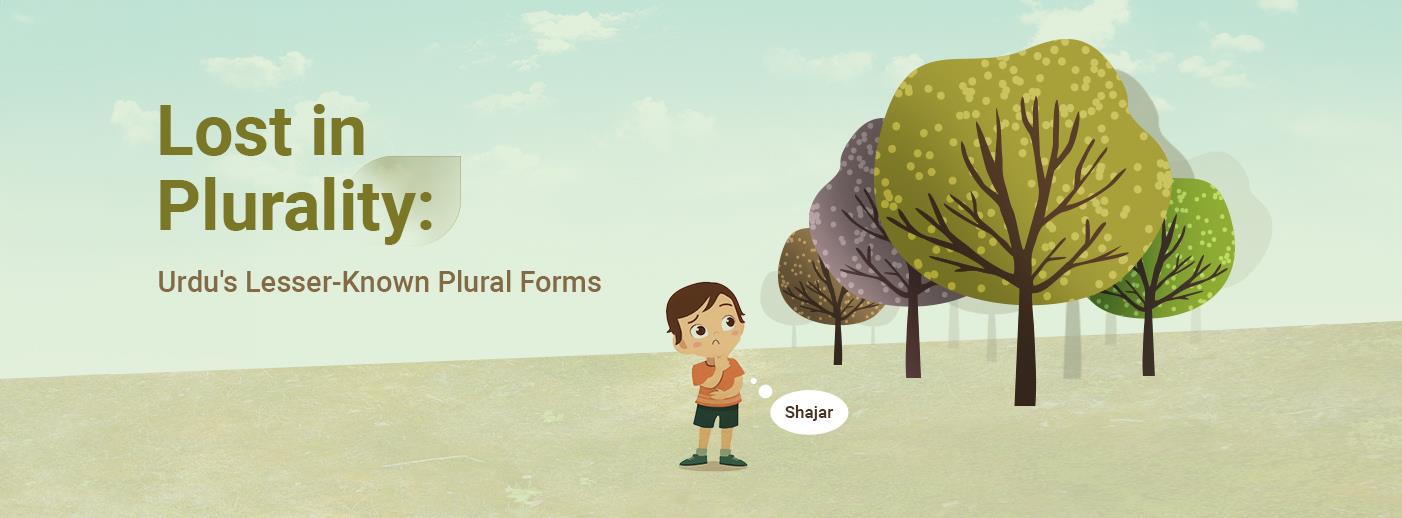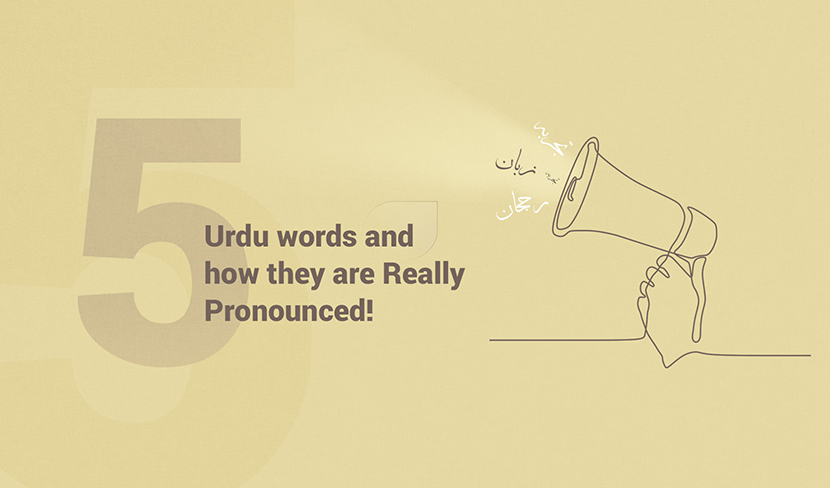अधिक खोजे गए शब्द
सहेजे गए शब्द
खिस्यानी बिल्ली खम्बा नोचे
जिसे क्रोध आ रहा हो वह अपनी खीझ या क्रोध दूसरों पर उतारता है, लाचारी में आदमी दूसरों पर क्रोध करता है, लज्जित व्यक्ति दूसरों पर अपनी लज्जा उतारता है, निर्बल की खीझ
कोशिश
कोई काम करने के लिए विशेष रूप से किया जानेवाला प्रयत्न, मेहनत, दौड़ धूप, प्रयत्न, प्रयास, चेष्टा, उद्योग, श्रम, उद्यम, उपाय, परिश्रम
आठ बार नौ त्योहार
सुख-सुविधा और आराम का शौक़ या लगन ऐसा बढ़ा हुआ है कि युग और समय उसको अल्प व्यय नहीं करने देता
चमनिस्तान
ऐसा बाग़ जहाँ फूल ही फूल हों, ऐसी जगह जहाँ दूर तक फूल ही फूल और हरा भरा नज़र आए, वाटिका, चमन, बाग़
दादरा
संगीत में एक प्रकार का चलता गाना (पक्के या शास्त्रीय गानों से भिन्न), एक प्रकार का गान, एक ताल
Lost in Plurality: Urdu's Lesser-Known Plural Forms

Urdu, a language of profound elegance and cultural richness, unfolds its hidden complexities beyond the surface. While it is renowned for its poetic charm, one facet often escapes the spotlight—the intriguing world of Urdu's lesser-known plural forms.
In the world of Urdu lexicology and syntax, we often find ourselves adding the familiar '-on' or '-ein' to create plurals, like transforming 'daraKHt' into 'daraKHton' or 'minnat' into 'minnatein.' It's like our default plural mode, right? But hold onto your linguistic hats, because here's the twist: these two trusty suffixes don't always create the correct plurals!
In the world of Urdu, there's a treasure trove of everyday words with plurals that break the mold. So, get ready to embark on an exciting quest to uncover these elusive and lesser-known plural forms. Acquainting oneself with these linguistic intricacies could undoubtedly set you apart in your next Urdu conversation, demonstrating a mastery of the language's subtle nuances.
Now, let's embark on this fascinating journey within a journey. The word "safar" is undeniably one of Urdu's most renowned words. Whether you're boasting about a leisurely vacation or flaunting your stroke of luck for a business class upgrade, "safar" is a term that's always on the move.
But pause for a moment in this linguistic voyage and ponder: what is the plural of "safar"? How would you express that your past journeys have been the highlight of the year? "safaron," "safaraat," "safarein"—none of these quite fit the bill, do they? Well, that's because the plural of "safar" is the intriguing and distinctive "asfaar."
One method of crafting plurals in Urdu involves adding "ا" in the initial position and "آ" in the middle position. Take the word "shajar" (tree), for example, which follows this rule to transform into its plural form: "ashjaar."
Now, consider the common word "fikr" (worry, apprehension), which undergoes a similar transformation to become "afkaar" in its plural form.
"daur" (period, time span) morphs into "advaar" in its plural version, exhibiting the pattern of "ا" in the initial position and "آ" in the middle position.
Let’s now look up the word ‘maqsad’, which means aim or objective. Have you ever stopped to ponder what its plural could be?
Still thinking, are you?
Well, that’s because the plural of maqsad is ‘maqaasid’, has been hiding under the cover for quite some time now and only a handful have been aware of its existence.
To form such plurals, changes are made at the middle position (usually by adding the آ sound) and a short -i sound towards the end positions.
The word ‘jaziira’ (islad) becomes’ jazaa.ir’ when converted to the plural form. Observe a similar pattern of changes occurring at the middle position (by adding the آ sound) and short i sound towards the final position of the word.
Up next we have plural forms that are formed by adding a ‘-uu’ sound before the final position of a word.
‘sadr’ (head of a gathering, leader) is a word commonly used in social settings. But, how often have you come across its plural? We bet on rarely.
‘suduur’, the plural of sadr is another hidden plural in Urdu that took the back-seat (ironical enough, right?)
Similarly, we tend to use ‘qabrien’ as the plural of ‘qabr’. Even though not outright incorrect, yet qabrien is not the actual plural of qabr, because the correct plural is ‘qubuur’.
And with that, we put a lid to this Pandora’s Box with rare Urdu plurals tucked within. But, worry not, we’ve got a lot more to explore. So, stay tuned, and we'll see you on our next adventure soon!
Delete 44 saved words?
क्या आप वास्तव में इन प्रविष्टियों को हटा रहे हैं? इन्हें पुन: पूर्ववत् करना संभव नहीं होगा





